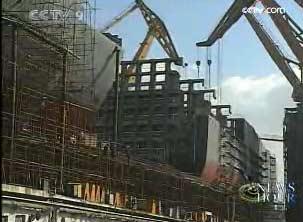Chinese authorities say boosting domestic demand as their number one task in efforts to limit impact from global economic turmoil. Analysts and government officials have long urged a shift to this position.
 |
|
A stimulus package estimated at four trillion yuan, or some 580 billion US dollars, will be spent over the next two years to finance programs in ten major areas. |
Vice Minister Mu Hong of the National Development and Reform Commission says the central government has adhered to a flexible and prudent macro-economic policy amid dramatic changes in the economic situation. Since the third quarter, because of the global financial crisis, China has implemented a series of measures to prevent declining growth and strong fluctuations in economic conditions.
The State Council decided to apply proactive fiscal policy, a moderately-easy monetary policy, and other policies to stabilize exports to boost domestic demand. They also sought to increase investments and make wide-ranging efforts to boost domestic demand.
A stimulus package estimated at four trillion yuan, or some 580 billion US dollars, will be spent over the next two years to finance programs in ten major areas. These areas include low-income housing, rural infrastructure, water, and electricity. Transportation, environmental protection, technological innovation and post-disaster reconstruction are also on the list of tasks to focus on. The policies also include a reduction in taxes, which could cut industry costs by 120 billion yuan.
Mu Hong, Vice Minister of Nat'l Development and Reform Commission, said, "The ten programs that the central government introduced are a series of means with very clear focus and direction. It covers both the short and long run. It will facilitate economic growth while pushing forward restructuring and adjustments of the development mode. It will increase investment while driving up consumption. It's of great significance in maintaining economic momentum while deepening reform in major industries."
Vice-Governor Yi Gang of the People's Bank of China spoke about financial liquidity. He says China's bank loans have risen as credit controls loosen. The PBOC decided to remove restrictions on bank credit to ensure steady and fast economic growth. Commercial banks' credit ceiling will also be abolished to allow for more lending to priority projects, such as those in rural areas, smaller enterprises, and technology. The easier loans will also help industrial growth through mergers and acquisition.
When asked to give an outlook for the future, officials say the source of recent global financial crisis comes from abroad, therefore will have a limited impact on China's financial system. Economic development within the country is still healthy, although the growth rate is slowing. China has a relatively complete export chain, and many enterprises in certain industries are still highly competitive internationally. The strong fundaments will ensure adequate time for domestic policy adjustments to revitalize the economy.
(CCTV November 15, 2008)